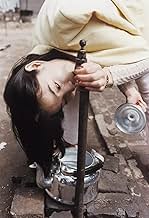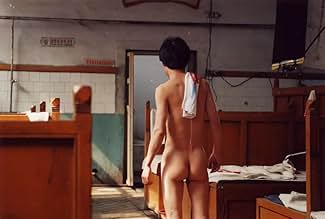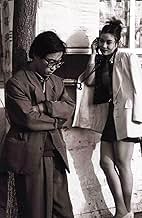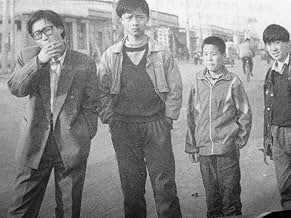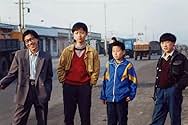CALIFICACIÓN DE IMDb
7.4/10
3.7 k
TU CALIFICACIÓN
Una historia de amor entre un carterista y una chica que hace la calle.Una historia de amor entre un carterista y una chica que hace la calle.Una historia de amor entre un carterista y una chica que hace la calle.
- Dirección
- Guionista
- Elenco
- Premios
- 7 premios ganados y 1 nominación en total
- Dirección
- Guionista
- Todo el elenco y el equipo
- Producción, taquilla y más en IMDbPro
Opiniones destacadas
I have seen the movie,but the quality of videotape is very bad,and cause the conversation is shangxi(a north province in china),so thought i am a chinese,i can't hardly hear it clearly.speak generelly,this movie reflect ture life condition in small town of china.many of people in town like xiaowu liang had been influenced deep by pop culture from Hongkong or China itself.and xiaowu is a poor low class in China.we are laughing when the movie play,but we are also shocked after the movie over.
Xiao Wu is a pickpocket in Beijing. Stuck on the bottom rung of the criminal ladder despite his advance into adult years, he heads a small group of thieving street urchins who haunt the back streets of the city. Xiao Wu is a surly character, prone to throwing away his cigarette ends when in other people's homes. His time is whiled away with games of Mahjong and American pool played out in the street and he has few close friends.
Xiao Wu's brother, Xiao Yong, once himself a petty thief, is now a cigarette trader and brothel-owner. Xiao Yong, shamed by his criminal roots and his brother's failure to move on from the same position, excludes Xiao Wu from his wedding invitations and refuses to accept his wedding gift of ill-gotten money. Later on, Xiao Wu also discovers the shame that his hardworking parents feel for their pickpocket son.
A sense develops that the world is moving on and that Xiao Wu is being left behind; this is increased by the ongoing police-led evictions from the street where he spends much of his time a new building project is on its way. Xiao Wu finds a glimmer of hope in his encounters with Mei Mei, an employee at the local brothel. The taciturn pickpocket opens up a little in her presence and the two of them bond, somewhat oddly from a Western perspective, through karaoke singing. Xiao Wu suddenly finds his singing voice when alone in a bathhouse; his plain voice resounds poignantly in the large, grimy, empty room. It is a rare moment of beauty.
When Xiao Wu buys a pager (state of the art in 1997) to keep in touch with Mei Mei it seems that he is starting to open up just a little to the changing world. But Mei Mei's sudden disappearance, along with his alienation from his family, leaves Xiao Wu without direction. A grim lack of purpose takes hold again. In the final frames of the film he is publicly humiliated, bringing the story to a sad end.
The footage in this film is much grainier than many people made be used to, but this is not necessarily a weakness: the image quality suits the grey, dilapidated city streets. The hand-held camera adds intimacy to the karaoke scenes and captures the distance between the two brothers as they walk separately through the same streets. The muffled state of the soundtrack takes some getting used to, but writer-director Zhang Ke Jia was clearly working on a limited budget for his first feature. The non-professional cast, however, is surprisingly effective; Hong Wei Wang is a real find, exuding a seedy charm in the lead role.
The Artificial Eye DVD which I watched this film on did not provide subtitles for many of the voices on radio and television, nor for some of the secondary characters, but there is an enormous amount of visual detail to take in as well. China simply does not feature enough on cinema screens, but this fine film suggests hope for the future.
Xiao Wu's brother, Xiao Yong, once himself a petty thief, is now a cigarette trader and brothel-owner. Xiao Yong, shamed by his criminal roots and his brother's failure to move on from the same position, excludes Xiao Wu from his wedding invitations and refuses to accept his wedding gift of ill-gotten money. Later on, Xiao Wu also discovers the shame that his hardworking parents feel for their pickpocket son.
A sense develops that the world is moving on and that Xiao Wu is being left behind; this is increased by the ongoing police-led evictions from the street where he spends much of his time a new building project is on its way. Xiao Wu finds a glimmer of hope in his encounters with Mei Mei, an employee at the local brothel. The taciturn pickpocket opens up a little in her presence and the two of them bond, somewhat oddly from a Western perspective, through karaoke singing. Xiao Wu suddenly finds his singing voice when alone in a bathhouse; his plain voice resounds poignantly in the large, grimy, empty room. It is a rare moment of beauty.
When Xiao Wu buys a pager (state of the art in 1997) to keep in touch with Mei Mei it seems that he is starting to open up just a little to the changing world. But Mei Mei's sudden disappearance, along with his alienation from his family, leaves Xiao Wu without direction. A grim lack of purpose takes hold again. In the final frames of the film he is publicly humiliated, bringing the story to a sad end.
The footage in this film is much grainier than many people made be used to, but this is not necessarily a weakness: the image quality suits the grey, dilapidated city streets. The hand-held camera adds intimacy to the karaoke scenes and captures the distance between the two brothers as they walk separately through the same streets. The muffled state of the soundtrack takes some getting used to, but writer-director Zhang Ke Jia was clearly working on a limited budget for his first feature. The non-professional cast, however, is surprisingly effective; Hong Wei Wang is a real find, exuding a seedy charm in the lead role.
The Artificial Eye DVD which I watched this film on did not provide subtitles for many of the voices on radio and television, nor for some of the secondary characters, but there is an enormous amount of visual detail to take in as well. China simply does not feature enough on cinema screens, but this fine film suggests hope for the future.
A 20-something in rural China who makes his small time living being a pickpocket faces two changes which pressure his life: a very public crackdown on crime, and a childhood friend having moved on to a respectable life, soon to be married, but not inviting him to the wedding. China itself seems to be changing, with signs of construction and modernization everywhere, but the main character, Xiao Wu (Wang Hongwei) is not progressing along with it, stubbornly sticking to his ways, despite the warnings from others.
There is a sense of forlorn emptiness here, as Xiao Wu starts falling for a karaoke girl, desperately seeking more meaning out of their relationship than she is. He returns home to his family, who are peasant farmers, and finds that his brothers are also moving on in life, and his father is angry to the point of casting him out. There are glimmers of him wanting to be a good person, like when he gives his mother a ring, or when he anonymously returns ID cards from the wallets he's stolen because they're hard for the owners to replace, but he continues stealing and seems hopelessly non-aspirational, thus making him a tough character to like.
Gandhi once said that "the true measure of any society can be found in how it treats its most vulnerable members," and while you could argue that Xiao Wu himself has preyed on the vulnerable, when he's publicly chastised on TV and later handcuffed to a post and surrounded by people gawking at him, the feeling of vulnerability is intense. We get the conflicting sense of it being just for him to punished, but at the same time, pity for him arriving at this place in life, and what his prospects might be. Therein lies the power of the film, and I certainly admired it.
The reason for not giving the film a higher rating was just a lack of personal enjoyment for what was a dreary story, centered exclusively on the main character, who was stuck in one gear. I would have loved a contrast in the development of his friend's or family's characters, those getting on in the world as best they can. Certainly a solid debut film from Jia Zhangke though.
There is a sense of forlorn emptiness here, as Xiao Wu starts falling for a karaoke girl, desperately seeking more meaning out of their relationship than she is. He returns home to his family, who are peasant farmers, and finds that his brothers are also moving on in life, and his father is angry to the point of casting him out. There are glimmers of him wanting to be a good person, like when he gives his mother a ring, or when he anonymously returns ID cards from the wallets he's stolen because they're hard for the owners to replace, but he continues stealing and seems hopelessly non-aspirational, thus making him a tough character to like.
Gandhi once said that "the true measure of any society can be found in how it treats its most vulnerable members," and while you could argue that Xiao Wu himself has preyed on the vulnerable, when he's publicly chastised on TV and later handcuffed to a post and surrounded by people gawking at him, the feeling of vulnerability is intense. We get the conflicting sense of it being just for him to punished, but at the same time, pity for him arriving at this place in life, and what his prospects might be. Therein lies the power of the film, and I certainly admired it.
The reason for not giving the film a higher rating was just a lack of personal enjoyment for what was a dreary story, centered exclusively on the main character, who was stuck in one gear. I would have loved a contrast in the development of his friend's or family's characters, those getting on in the world as best they can. Certainly a solid debut film from Jia Zhangke though.
The sound mixing is garbage, with a substantial amount of noise. The dialect cannot be understood. The camera is shaky. The performance is pretty amateurish. The pace is slow. All in all, this film is an unwatchable mess.
10cd1793
Xiaowu is an average young man in a typical small town in China. He is shy, stubborn, values friendship, sometimes vanity-driven, sometimes even romantic. And he is a pick-pocket.
It is surprising that although hundreds of millions of people lead their lives like xiaowu, "Xiao Wu" is the first candid depiction of their life in the many years of chinese filmmaking. I was particularly struck by the camera's honesty: run-down buildings along littered streets, filthy public bath places, hidden brothels camouflaged as karaoke shops...
As the country opens up for economical changes, some people have "their own ways" to take advantage of the change and became rich, while the rest struggle to make a living. The film provided vivid portraits of people you probably know or have heard of: the former pick-pocket buddy of xiaowu who became a famous entrepreneur and grew ashamed of having a friend who picks pockets; the girl who works at a Karaoke but tells her mom that she's at school, who dreams of becoming a star and fell in love with xiaowu but eventually "contracted" herself to a rich man from Shan Xi...
Even if you are not particularly interested in the setting of the film, the universal conflict of dignity and making a living, vanity and friendship, dream and reality, makes this film very interesting to watch.
Bravo, Jia ZhangKe! I give this film a 10/10 for being the first of a genre that will shine in chinese cinema.
It is surprising that although hundreds of millions of people lead their lives like xiaowu, "Xiao Wu" is the first candid depiction of their life in the many years of chinese filmmaking. I was particularly struck by the camera's honesty: run-down buildings along littered streets, filthy public bath places, hidden brothels camouflaged as karaoke shops...
As the country opens up for economical changes, some people have "their own ways" to take advantage of the change and became rich, while the rest struggle to make a living. The film provided vivid portraits of people you probably know or have heard of: the former pick-pocket buddy of xiaowu who became a famous entrepreneur and grew ashamed of having a friend who picks pockets; the girl who works at a Karaoke but tells her mom that she's at school, who dreams of becoming a star and fell in love with xiaowu but eventually "contracted" herself to a rich man from Shan Xi...
Even if you are not particularly interested in the setting of the film, the universal conflict of dignity and making a living, vanity and friendship, dream and reality, makes this film very interesting to watch.
Bravo, Jia ZhangKe! I give this film a 10/10 for being the first of a genre that will shine in chinese cinema.
¿Sabías que…?
- TriviaJia Zhang-ke: the man sent by Xiao Yang to return Xiao Wu's wedding present.
- ConexionesReferenced in Ren xiao yao (2002)
Selecciones populares
Inicia sesión para calificar y agrega a la lista de videos para obtener recomendaciones personalizadas
- How long is Pickpocket?Con tecnología de Alexa
Detalles
Taquilla
- Total a nivel mundial
- USD 1,569
- Tiempo de ejecución
- 1h 50min(110 min)
- Color
- Relación de aspecto
- 1.37 : 1
Contribuir a esta página
Sugiere una edición o agrega el contenido que falta

